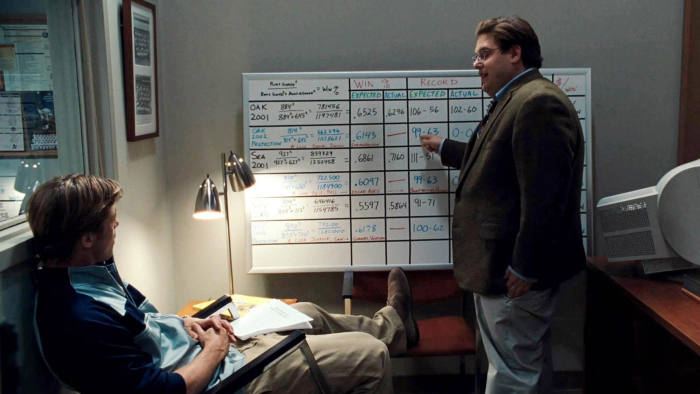An MBA can improve your salary, your connections and your career prospective clients — but what will you actually find out? In an occasional series, we showcase the function of academics at prime-rated enterprise educational institutions.
At one particular level in Moneyball, Michael Lewis’ book on the inconceivable winning operate of the Oakland A’s in the early 2000s, Billy Beane, basic supervisor of the underfunded baseball outfit, can make a astonishing declaration. His statistical assessment does not function in the play-offs, he says — that’s down to luck.
He uses far more vibrant language, but the level is that Beane is mindful that, for all his ingenuity in pinpointing undervalued gamers, luck or randomness is an inescapable factor in baseball, as it is in all walks of lifestyle.
Still luck played a portion in the story in far more methods than one particular. Moneyball is generally portrayed as a triumph of data assessment, but that is not ample to make clear the accomplishment of the A’s, simply because data on gamers as nicely as the methods for crunching it had been publicly available for many years. What served swing points Beane’s way was his rivals’ tendency to access much too soon for luck as an rationalization for efficiency.
Over a lot of decades, scouts and group supervisors had designed up stereotypes about what very good gamers looked like. Knowledgeable but counter-stereotypical gamers these as the “submarine pitcher” Chad Bradford were underestimated simply because supervisors concluded that their successes had to be down to mere luck. These types of biases — and the consequent misattribution of luck — protected these “hidden gems” from discovery until finally Beane’s statistical solution minimize by means of to the details.
The consequence was a group that could take on the giants of the activity and access the play-offs 4 seasons functioning. Thanks to Lewis’s book, Beane’s tactic has develop into common across baseball and has filtered into other sports.

This contrarian solution can be used in enterprise as nicely, wherever tactic and behavioural science can be blended to exploit irrational biases. I connect with this “analytical behavioural strategy”: it consists in drawing on behavioural science to lookup for contrarian alternatives, and then making use of data assessment to formulate an exploitation tactic.
For occasion, most folks really don’t anticipate regression to the signify — that is, that the exceptional will most likely be adopted by the typical. This, however, is the likeliest outcome whenever a business’s efficiency — in terms of revenue, say — is not solely under the command of those people in demand.
A terrific efficiency could propose that supervisors are doing a terrific work, but it is far more most likely to arise from fortuitous timing — luck. By definition, luck is not heading to persist: the business’s upcoming efficiency will regress downward to the signify. A very good contrarian strategist appears to be for evidence that rivals are not mindful of this.
Acquire “top CEOs”, for illustration — especially the annual prime thirty record compiled by Barron’s magazine. When I analysed the 2005-10 line-ups in terms of how the companies they led carried out, a obvious, inverted V-form sample emerged: the efficiency (as calculated by factors these as revenue advancement, profitability and inventory value) improved ahead of the CEO made the record, but plummeted later on.
The standard explanations for these decrease contain complacency or hubris on the portion of the CEO. A simpler rationalization, nevertheless, is that the CEOs were in no way that specific in the initial place. It was luck that enabled them to attract unwarranted awareness just after successes. And it was (negative) luck that made a lot of of them attract unwarranted blame just after failures.
A contrarian strategist can earnings from rivals’ “luck biases” in at least two methods: quick provide and acquire minimal. A salient accomplishment is almost never sustainable but the market ordinarily thinks normally. Look at the fifty companies featured in a few of the most popular enterprise bestsellers of the previous forty decades: In Search of Excellence, Superior to Fantastic and Crafted to Last. Of the fifty, sixteen unsuccessful inside of 5 decades just after the guides in which they starred were released, and 23 grew to become mediocre as they underperformed in the S&P five hundred index.

Up coming time you look through the enterprise bestsellers portion, pay awareness to the companies featured. As an alternative of making an attempt to emulate them, as your rivals could do, you should really make these “role models” your focus on for quick providing.
On the other hand, alternatives also lurk in the “regression upward” that generally follows a notable failure. A common reaction to failure is to uncover scapegoats and hearth them — as a lot of ex-CEOs and sports coaches can attest. Even so, the far more excessive the failure, the considerably less we should really attribute it to the person, and the far more to the method. Or else we produce an option for the shrewd contrarian, who can move in and employ the service of the scapegoat.
Organizations that are mindful of these biases are improved placed than those people that aren’t. Fortune favours the strategist with a obvious-eyed perspective of luck.
Chengwei Liu is affiliate professor of tactic and behavioural science at Warwick Company Faculty and ESMT Berlin and author of ‘Luck, A Vital Plan for Company and Society’ (Routledge)








More Stories
How To Start A Startup | How To Start A Business
A 13-Part Manifesto For Creating a Kickass Content Brief
How brands are using CTV and OTT for the 2022 FIFA World Cup